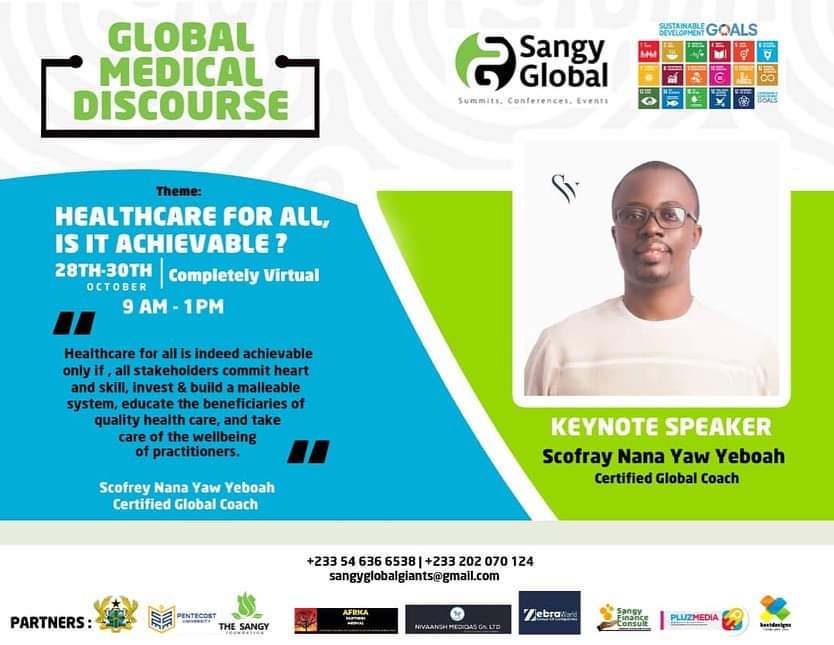Mr. Scofray Nana Yaw Yeboah, Transformational Coach and Lead Consultant for Zoweh Global Consult has hinted that access to quality healthcare for all is achievable only if all stakeholders commit heart and skill, invest and build a malleable system, educate the beneficiaries of quality health care, and take care of the wellbeing of the practitioners.
He said the kind of leadership and beingness needed to make healthcare for all achievable would be a sharp mindset and attitudinal shift across all stakeholders in the healthcare ecosystem, namely, governments, practitioners, and citizens (healthizens as I call this unique group).
“A more profound shift is needed from policy lips-servicing to committed-action and evidence base investment from the governmental level. SDG 3, good health and well-being are intricately interlocked with all the 16 other goals.
…From basic education, gender, food, poverty, climate change, etc., all have a bearing on Africans’ health and well-being. I dully acknowledge the massive efforts in infrastructural investment in Ghana, but it won’t be very meaningful until it is linked to the total healthcare and wellbeing of the citizens”, he explained.

Scofray Nana Yaw Yeboah said this at the maiden edition of Global Medical Discourse GMD, a 3-day event organized by Sangy Global in Accra Ghana at the Pentecost University of College from 28th to 30th October 2021.
In the 2021 global life expectancy rating, no African nation made it to the first 60. Among our best is Algeria placing 63rd with 77.5 L.E (life expectancy 2021), Morocco 66th with 77.43 L.E, Tunisia 68th with 77.36 L.E, Mauritius 88th with 75.51 L.E, Seychelles 107th with 73.74, Cabo Verde 108th with 73.58. This is according to Worldometers with data based on the latest United Nations Population Division estimates.
In relative regional bloc terms, Northern Africa scores 74, Eastern Africa 66, southern Africa 62, middle Africa 61, and Western Africa 59. The whole of Africa relative to the rest of the world is 64.5
Emphasising that, one of the surest ways to provide a robust healthcare ecosystem is to integrate or interlock healthcare with all other development plans.

“To sum up, achieving quality healthcare for all is a possibility when everyone commits to it. Africa must acknowledge the opportunity covid-19 has presented us, so we wake up from the begging with a cup in hand mentality to challenge our status quo. Singapore, United Arab Emirates, Cuba, Korea, Finland, Denmark, Sweden, etc., which are peers to many other African countries, have left us behind. So we don’t have any excuse when we get questioned by our children.
….Many sons and daughters of African descent are willing, but the climate of environment, lack of investment, unproductive partisan politics, uncoordinated strategic development initiatives, corruption, and almighty endemic deficit of transformational leaders. Therefore, although our challenges are pregnant with possibilities, let us not wait till others, through some exploitative investment and inculturation, take over our health care, education, agriculture, research & development, country planning, etc. Another Africa is possible; let us build it together, where quality health care and well-being are accessible”.
He urged everyone to make all efforts to invest in the total wellbeing of their lives such that faulty systems can be anchored in growth and development.
Moreover, he said citizens must demand and compel quality healthcare from leadership. Hence, we should deliberate to shy away from the campaign rhetorics they offer us on campaign platforms.
In attendance were practitioners in the medical and health ecosystem comprising of doctors, nurses, researchers, lab technicians, and other allied health workers amidst lawyers, lecturers, students, business personalities, etc.
















































